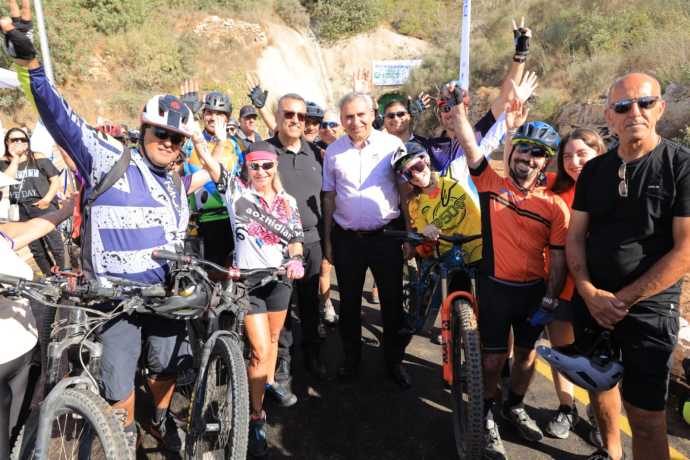The Kerem Tunnel, the first bicycle tunnel in Israel, has been inaugurated as part of the Jerusalem Ring Path, a 42-kilometer cycling route that surrounds the capital city.
The tunnel connects the path between Nahal Refaim and Emek Motza. Its southern entrance is in Refaim Park, below Ein Laban, and the northern entrance is located in Nahal Ein Kerem, about half a kilometer from the Kerem junction.
The 2.1-kilometers-long tunnel project was inaugurated in a ceremony on Thursday attended by Jerusalem and Heritage Minister Ze’ev Elkin, Mayor Moshe Lion, Gihon water company chairman Avi Baleshnikov and hundreds of cyclists.
“In the past, Jerusalem was an attractive tourist city due to its glorious past. Today, apart from its historical treasures, it also incorporates modern tourism,” Elkin said. ”The inauguration of [this] tunnel project is another part of the development of the city of Jerusalem and its transformation into an attractive tourist city for all types of audiences in Israel and throughout the world.”
Elkin, whose ministry together with the Jerusalem Municipality spearheaded the project, said his ministry “invests hundreds of millions of shekels each year in the development of all aspects of Jerusalem’s tourism and in the creation of innovative attractions and ventures that connect the glorious historical past of our eternal capital to its future... I invite cycling enthusiasts to come and enjoy a modern and well-maintained cycling route that overlooks the special landscape of Old Jerusalem.”
About NIS 25 million was invested in the project, budgeted by Elkin’s ministry, the Tourism Ministry, the Jerusalem Municipality, the Gihon Corporation and the Jerusalem Purification and Sewerage Works, with the work carried out by the Jerusalem Development Authority.

“The Kerem Tunnel project is a central tool for realizing the vision to change the concept of transportation throughout Jerusalem,” Elkin emphasized. “The new tunnel, which connects to the long Jerusalem Ring Path, will join the existing bicycle paths in the city and those that will be paved in its various neighborhoods, with the aim of encouraging cycling among its residents and its visitors and promoting the green transportation revolution in the capital city.”
The Kerem Tunnel was first excavated in the 1990s to move the main sewer line of the Gihon Corporation toward the purification plant in Sorek, which is located west of the city and is currently used as an infrastructure tunnel that also includes the fifth water line to Jerusalem of the Mekorot water company.
"The Kerem tunnel project is a central tool for realizing the vision to change the concept of transportation throughout Jerusalem."
Jerusalem Mayor Moshe Leon
The works currently underway include road construction, installation of blowers and advanced electrical and safety systems, to make the tunnel safe for the public to pass through all year round.
The Kerem Tunnel also allows access to unique recreation sites – including the Ein Kerem neighborhood, the biblical zoo and aquarium, as well as the historic natural springs of Ein Laban and Ein Haniyeh.
